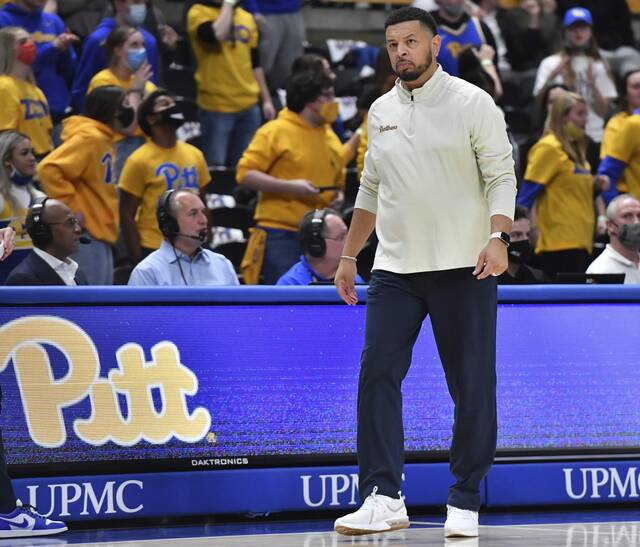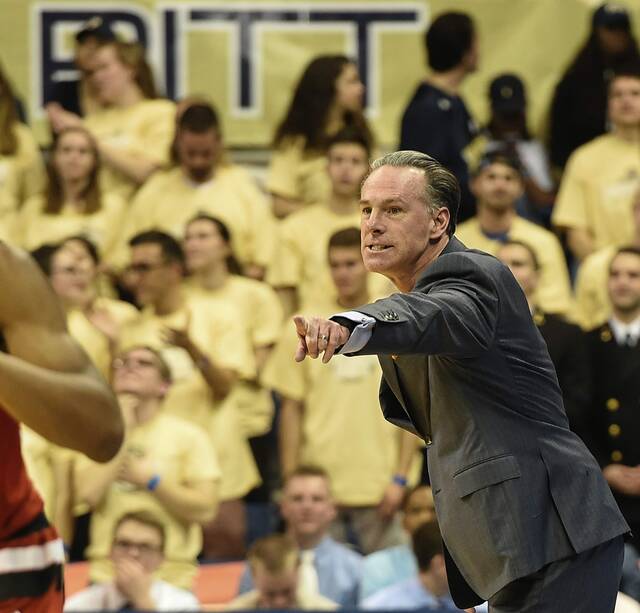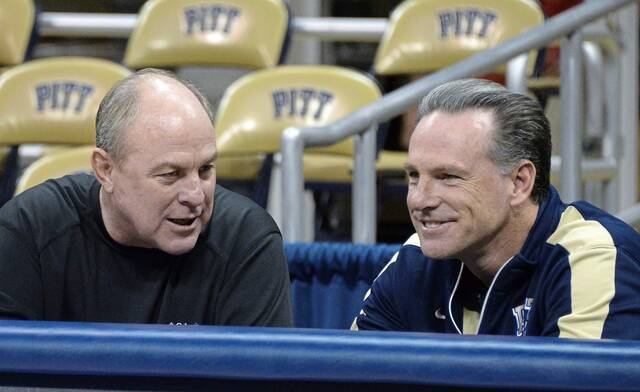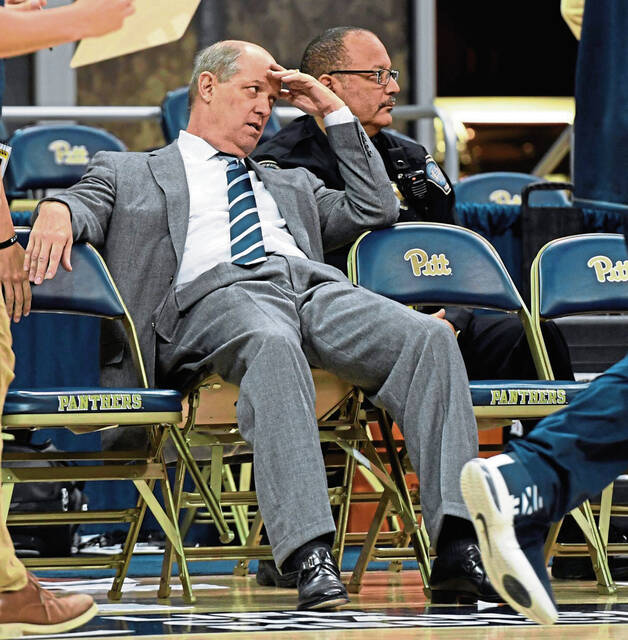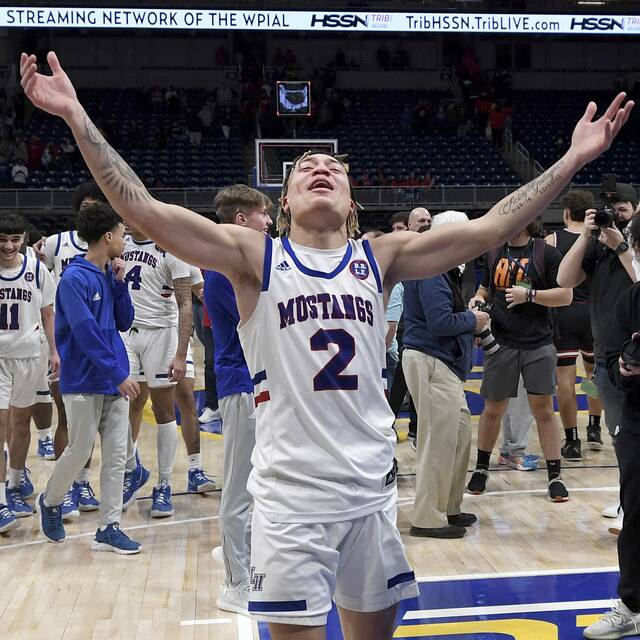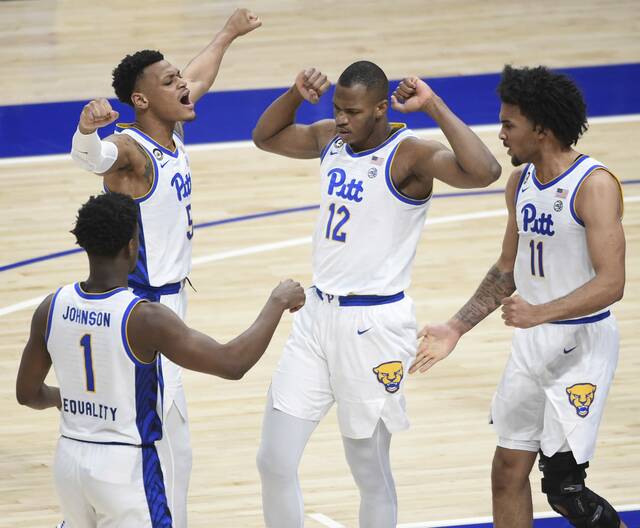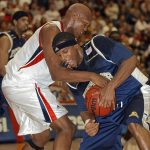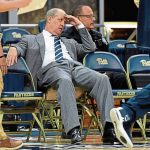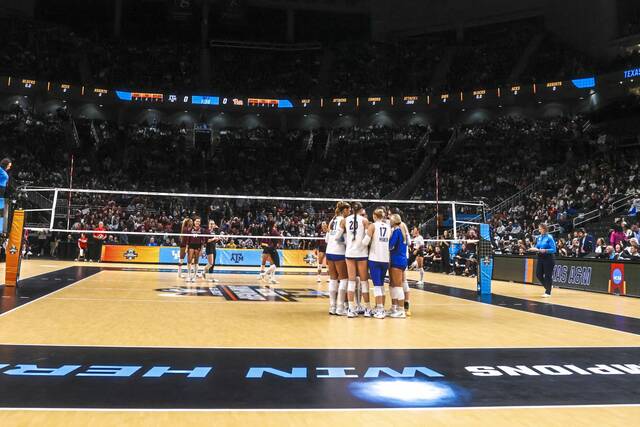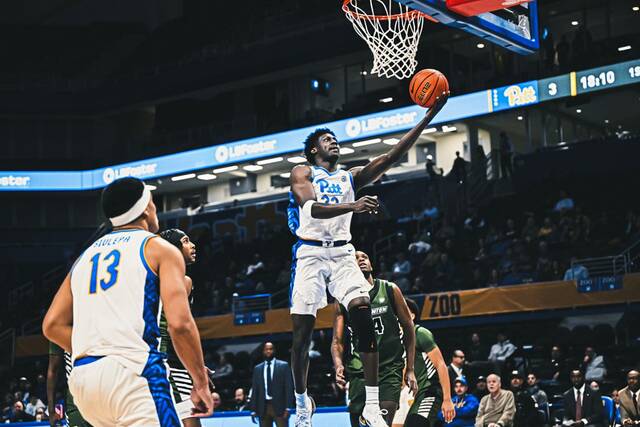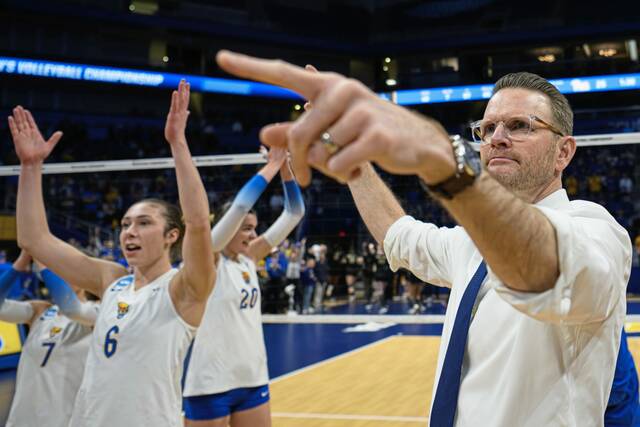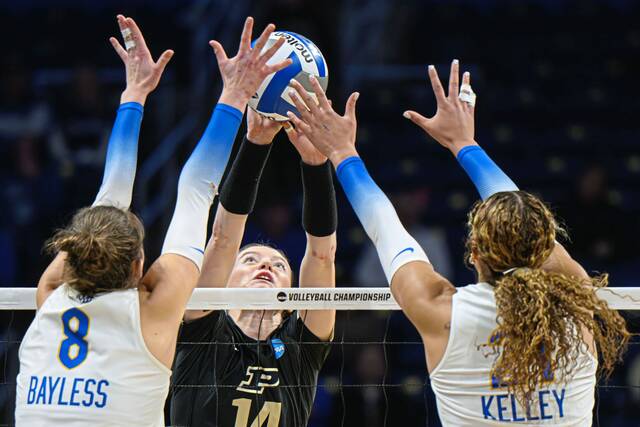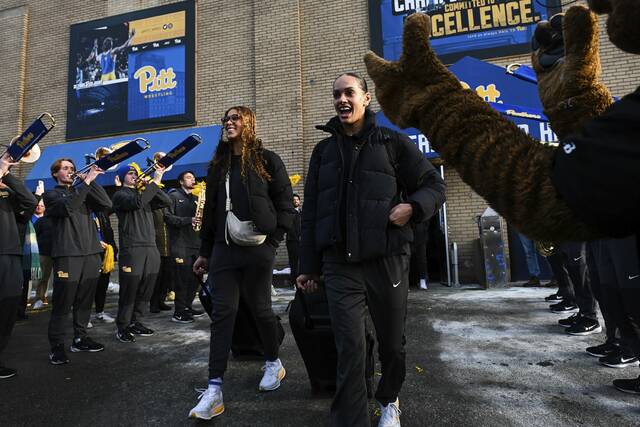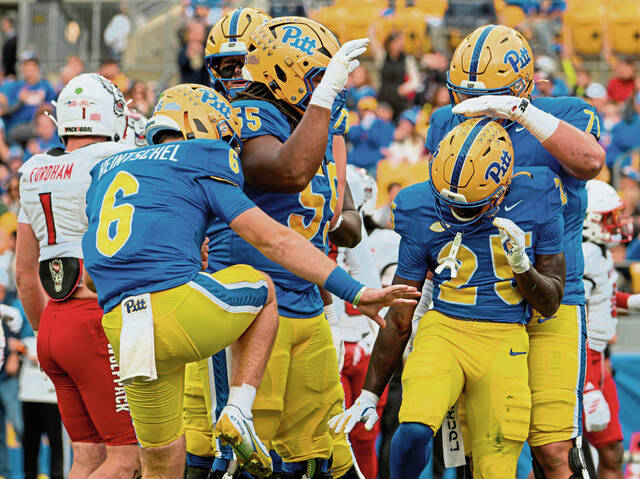Noise used to sweep Petersen Events Center like a tidal wave.
So did great teams and iconic players.
Focus was difficult for opponents while the home team fed off the atmosphere.
Conversations with the person in the next seat were nearly impossible. The noise was so pervasive, even the screens on press row laptops shook.
For a 13-year period from 2002-14 (starting with the final season at Fitzgerald Fieldhouse and ending with the first in the ACC), Pitt went to the NCAA Tournament 12 times. Yet, when names are called next Sunday, Pitt won’t be among them barring a miracle run through the ACC Tournament, which begins Tuesday. The school hasn’t earned a berth since 2016.
Under former coaches Ben Howland and Jamie Dixon, Pitt earned two No. 1 seeds and made it to five Sweet 16s, including a memorable trip to the 2009 Elite 8 that ended one game — a 78-76 last-second loss to Villanova — from the Final Four.
It started with Howland, who was hired in 1999 to restore juice to a program that had missed six consecutive NCAA Tournaments. A year later, Pitt was in the NIT. A year after that, the Panthers won two games at Pittsburgh’s Mellon Arena in the first rounds of the NCAA Tournament and finished with a school-record 29 victories.
“Nobody picked us to do anything,” said Julius Page, one of 16 Pitt players from 2002-11 who scored more than 1,000 career points. “We just had the right attitude in regards to how we were conducting business.
“We didn’t drop the ball when it was in our hands.”
Howland and Dixon were recruiting to the Big East, with the treat at the end of the season the tournament at Madison Square Garden. They were not only good recruiters, but they knew how to develop talent.
“Page, (Brandon) Knight, (Chevy) Troutman, Sam Young, those guys were not highly recruited guys,” said Mike DeCourcy, longtime Pittsburgher, Elizabeth Forward graduate and one of the most respected college basketball voices in the country. “They were really good, talented players who were hard workers, who were overlooked or undervalued, who were willing to be team guys and they won because of that.
“I loved what Pitt basketball was. I thought what Ben and Jamie built was remarkable.”
Lack of local talent
The best recruiters cast a wide net while keeping a close watch on their backyard, but the local talent pool has not offered Pitt a significant boost in recent years.
Yet, DeCourcy recalls what now can be called the golden days of Western Pennsylvania high school hoops.
“When I was growing up, it was the era of Jeep Kelly and B.B. Flenory and Sam Clancy, Bruce Atkins and Doug Arnold,” he said. “There were lots of good players.”
In recent years, Butler’s Ethan Morton matriculated to Purdue. Cam Johnson of Our Lady of the Sacred Heart went to Pitt, became disillusioned and transferred to North Carolina where he became first-team All-ACC and a first-round draft choice in the NBA. His brother, Puff, also plays at North Carolina. Currently, Laurel Highlands junior Rodney Gallagher has several D-I offers and might be the most talented prospect in the area, but he has said he will focus on football in college.
“You can’t rely on (local talent),” said DeCourcy, who writes a column for The Sporting News and is a studio analyst for the Big Ten Network. “You have to find a source for talent, and that is not easy to do.”
The ACC era
In 2013, Pitt left the Big East, where it had played in seven tournament championship games in an eight-year span, seeking increased riches in the ACC.
The move has given the university a big financial boost, with the ACC distributing a record $497.2 million to its member institutions in the 2019-20 financial year, according to ESPN. That computes to more than $30 million per institution and an overall bump of $42 million over the previous year, thanks in large part to the ACC Network generating revenue — and exposure — for the entire athletic program.
Meanwhile, Pitt has won or shared ACC championships in wrestling, women’s volleyball (three times), men’s soccer (regular season) and football. Basketball? Pitt hasn’t won more than one game in the ACC Tournament since winning two in its first season (2013-14).
A basketball program that used to pack Petersen Events Center with excited fans has not found a comfortable niche in the ACC in nine seasons.
Dixon did OK in the ACC for three seasons — but no better than that — before he left for TCU. His final three Pitt teams were 66-37 overall (28-26 in the ACC) with two trips to the NCAA Tournament. Since Dixon was 9-9 in 2016, Pitt hasn’t won more than six conference games in any regular season. Contacted for this story, Dixon declined comment, other than to say he enjoyed his 17-year stay in Pittsburgh.
“He loved Pittsburgh,” DeCourcy said. “He turned down lots of great jobs. He wanted to be in Pittsburgh. But, ultimately, he saw that that job was going to be more difficult.”
Former Pitt athletic director Scott Barnes made no great attempt to retain Dixon before he hired Kevin Stallings in 2016. Barnes’ successor, Heather Lyke, fired Stallings after two years and an embarrassing 4-32 record in the conference.
Which brings the program to Jeff Capel, who is set to wrap up his fourth season. Pitt (11-20, 6-14) will finish with more defeats than victories for the sixth consecutive season, tying a 70-year-old school record. It also is only the second 20-loss season since 1977.
Those blemishes are more difficult to accept in a season where the ACC has only one team — No. 4 Duke — ranked in the Associated Press Top 25. In fact, Notre Dame is the only other school that received voting points last week (a minuscule nine).
Capel, who has been a college head coach or assistant since 2000, is 51-68 (21-53 ACC), at Pitt. Two years ago, in the middle of a seven-game losing streak, he pleaded for patience while trying to rebuild what Stallings left behind.
“We need time to recruit and then we have to win some recruiting battles,” he said after an 82-67 loss at Florida State on Feb. 18, 2020. “It’s going to happen. It’s not going to happen right away.
“There was a dumpster fire that I took over.”
In the past six seasons, including Stallings’ two, Pitt is 75-109 (.407), 25-85 (.227) in conference games.
It’s difficult to recruit to a losing program — there currently are no new players set to enroll in time for the next academic year — and Capel has been hit hard by the transfer portal.
Xavier Johnson and Au’Diese Toney were two of Capel’s first recruits and important members of the team for three seasons. But they left last year with three regular-season games remaining while they were being overshadowed by Justin Champagnie, who eventually was named first-team All-ACC. Team chemistry was a serious problem.
“Getting the chemistry together isn’t always the easiest thing to do,” Page said. “I can go back to my teams. We didn’t always get along. When we got between the lines, everything just fell into place because at the end of the day, we just wanted to win.”
Johnson and Toney transferred and became starters at winning programs. Johnson is averaging 11.8 points and 4.8 assists at Indiana (18-11, 9-10 Big Ten) and Toney 10.4 points and 5.3 rebounds at No. 14 Arkansas (24-7, 13-5 SEC). Losing Champagnie to the NBA last year when he had eligibility remaining was another difficult blow. Trey McGowens, who enrolled with Johnson and Toney, transferred to Nebraska after 2019-20.
The important question
The issue Capel is facing is this:
Why can’t he find — and keep — enough players to become more competitive in the ACC after Howland and Dixon achieved sustained success in the Big East for more than a decade? Capel partially answered with his “dumpster fire” remark, but that was two years ago.
“There are problems that are sort of macro that Jeff inherited when he accepted the job that are difficult to combat,” DeCourcy said. “We’re seeing that reflected now in, really, the third iteration of a coaching tenure that’s tried to deal with this.
“Jamie, it began toward the end of his time, and he got out before it really had the most profound impact. It devastated Stallings, not surprising because I don’t think he was an ideal hire for the job.
“Jeff is encountering the same problem I predicted the day it was reported they were leaving the Big East for the ACC. I wrote a column that said, ‘Look, this whole thing is built on the Big East and the recruiting base that exists from D.C. through Philly through New Jersey to New York and selling those players, most of them three-star types, hard-working, high-character types that weren’t getting offers from the biggest programs like UConn and such, Villanova, but were really good players.’
“They were sold on playing at home three, four times a year because if you’re going to Villanova, that’s home for north Jersey, south Jersey, D.C. If you’re going to St. John’s, same thing. It’s only a couple-hour train ride away.
“And at the end of the year, there was the Garden (for the Big East Tournament) and what a big deal that was. They were able to build that program on that foundation.
“Where are you going to get your players now? Are you going down south to get your players? Do they want to go to school in the city? How many city schools are there (in the ACC)? Pittsburgh is a city school.
“I don’t think that’s an easy problem to solve.”
DeCourcy praised Capel’s first recruiting class of Johnson, Toney and McGowens, but with a critical disclaimer.
“They didn’t connect to each other,” he said. “They didn’t connect to the program. Some of them didn’t stick around long enough to be successful. When they departed, you were left with not enough ability.
“It comes down to now they’re kind of starting over. You can start over pretty quickly in college basketball now with the immediate transfer concept. But what are you selling inside your league that players want to buy? That’s the challenge. Jeff has to find a way to answer that, just as Kevin tried and Jamie tried toward the end of his tenure.”
Two years ago, Pitt signed Capel to a contract extension through 2027. The day Pitt announced the deal (Jan. 8, 2020), the Panthers won at North Carolina, 73-65, to improve to 11-4. From there, Pitt lost 13 of its final 18 games that season, 45 of 71 overall.
Capel was successful as a head coach at VCU (79 victories in four years) and Oklahoma (where he recruited four McDonald’s All-Americans and joined Pitt in the 2009 Elite Eight as a 34-year-old).
DeCourcy said he doesn’t see the point in starting over with a new coach, but he added that Lyke has an especially difficult challenge with basketball. Last month, Lyke said she has “a lot of confidence” in Capel and his staff. Plus, she would need to buy out the remaining five years of his contract, a prohibitive sum that’s likely far more than $10 million.
“I think Heather Lyke is doing a tremendous job,” DeCourcy said. “This particular sport is her biggest challenge, the one that’s most difficult. There are a lot of programs that want to be good at basketball. And lots of those places are a lot more proximate to good basketball talent than Pittsburgh is.
“(Capel) needs to find a way to build a roster on top of what he has. He has some decent players. He needs to get some good transfers that, inevitably, will be in the portal in March and April and he needs to find a way to win with them.
“It’s still a challenge because you’re selling a program that has not been successful. Most of the transfers want to go somewhere where there’s an opportunity (to win).
“In Pitt’s case, they need to find guys who are willing to be the foundation, and that’s not always easy to do.”



